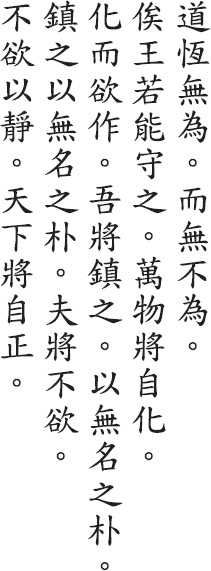37
 |
The Tao makes no effort at all yet there is nothing it doesn’t do if a ruler could uphold it the people by themselves would change and changing if their desires stirred he could make them still with simplicity that has no name and stilled by nameless simplicity they would not desire and not desiring be at peace the world would fix itself |
CHUANG-TZU says, “The ancients ruled the world by doing nothing. This is the Virtue of Heaven. Heaven moves without moving” (Chuangtzu: 12.1).
WU CH’ENG says, “The Tao’s lack of effort is ancient and eternal and not simply temporary. Although it makes no effort, it does everything it should do. If rulers could uphold this Tao of effortlessness, without consciously thinking about changing others, others would change by themselves.”
LAO-TZU says, “I make no effort / and the people transform themselves” (Taoteching: 57).
TE-CH’ING says, “If nobles and kings could only uphold the Tao, all creatures would change by themselves without thinking about changing. This is the effect of upholding the Tao. When creatures first change, their desires disappear. But before long, their trust fades and feelings well up and begin to flow until desires reappear. When this occurs, those who are adept at saving others must block the source of desire with nameless simplicity.”
HO-SHANG KUNG says, “‘Nameless simplicity’ refers to the Tao, which all creatures use to transform themselves and which nobles and kings use to pacify those who engage in cleverness and deceit.”
CH’ENG HSUAN-YING says, “When people first change and begin to cultivate the Tao, they think about reaching a goal. Once this desire arises, it must be stilled with the Tao’s nameless simplicity.”
SU CH’E says, “Sages have no thought of embracing simplicity, nor do they show any sign of doing so. If the thought of becoming simple existed in their hearts, they would miss the mark completely.”
HSUAN-TSUNG says, “Once rulers use nameless simplicity to still the desires of the people, they must then give it up so that the people don’t follow its tracks and once again enter the realm of action. Once our illness is cured, we put away the medicine. Once we are across the river, we leave the boat behind. And once we are free of desire, we must also forget the desire to be free of desire. Serene and at peace, the ruler does nothing, while the world takes care of itself.”
SUNG CH’ANG-HSING says, “Other creatures follow their natures without creating chaos or disaster. They change by themselves without seeking change. People, meanwhile, race through the realm of existence and never know a quiet moment. They abandon their original innocence and don’t practice the true Tao of doing nothing. They don’t care about their lives, until one day they offend and retribution arrives.”
Name takes sides. Complexity limits options. Hence, those who uphold nameless simplicity don’t take sides and keep their options open. The first two lines appear as one line in verse 48 (line five). In place of the first line, the Mawangtui texts have: “The Tao has no name at all.” But this must be an interpolation from verse 32 and appears in no other edition. The Kuotien texts have the same first line but omit the second line, as do the Mawangtui texts. In lines nine and ten, the Mawangtui texts replace yu (desire) with ju (shame). Although I haven’t followed that emendation, I have followed the Mawangtui repetition of chen-chih-yi (stilled by) at the beginning of line eight. The Kuotien texts omit line eight and in lines nine and ten replace pu-yu (no desire) with chih-tsu (know when they have enough). In the last line, the Mawangtui texts replace t’ien-hsia (the world) with t’ien-ti (heaven and earth), while the Kuotien texts have wan-wu (all things).